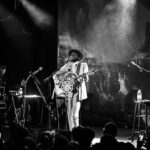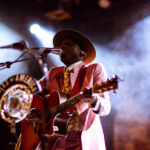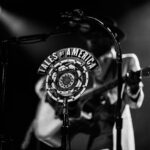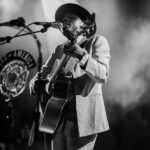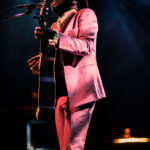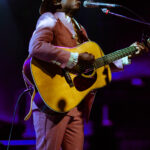Photography by Sam Wachs
By Megan Doherty
Check out Megan's Show Review of J.S. Ondara
Folk singer J.S. Ondara performed at The Sinclair on Friday, November 1. Before taking the stage to his sold-out show, he spoke to WERS Staff Writer Megan Doherty about potential new music coming soon, the promises and state of contemporary America, and writing songs without instruments.
You released your debut album earlier this year and just put out the deluxe version of the album in September with five bonus tracks. What was the reason behind releasing so much music in such a short span of time so early in your career?
J.S. ONDARA: I wrote in excess of a hundred songs for the record and I had to kick out the majority of that to narrow it down to eleven songs. It's obviously a bunch of songs that need to go somewhere, and so we decided to release the deluxe version of the LP to share some of the songs because most of them were just going to be thrown away and disappear.
Do you think you'll continue to put out a lot of music at once?
ONDARA: Sure, yeah. There's a new album coming next year.
Do you want to elaborate on that?
ONDARA: Without giving any spoilers, I'm making a new record that's going to be a move forward from this record. It's going to be more experimental for me. I'm halfway done at the moment. I'll be done and it'll be out by next year. So at some point next year it's going to come out. I'm excited to share it.
So when you say experimental, do you mean less acoustic and more into something electronic, or with electric guitar?
ONDARA: It's definitely not all acoustic. That's as much as I can say. I think my LP one-my first record's mostly acoustic. This one's not. I'm experimenting with different sounds and different instruments. It's a more busy record so to speak, if that makes some kind of sense.
Yeah, definitely. Earlier this year you played in Boston at The Red Room at Cafe 939, and now you sold out The Sinclair. Now that you're playing in bigger venues, how has the fan response been?
ONDARA: It's still pretty intimate so far. The rooms still feel intimate. You know, when the crowds are bigger it still feels like a sort of conversation with the fans, just because the show is still me and a guitar for the most part. That intimacy hasn't disappeared yet.
So, your album's all about America. Did you always know you wanted to write an entire record about America?
ONDARA: I did. Yeah, I did. I definitely had this sort of romantic idea about America. My first record was going to be about America, you know? When I came out five years ago-that was always going to be my first record.
What's the American Dream to you?
ONDARA: I don't know. I think it's the idea that you can be absolutely free. You can strive to be the best version of yourself in the universe. You can make a living doing things you don't absolutely hate. I think over time that idea is finding new meaning for me as I live in America and put myself in situations of day-to-day Americans.
Has that concept of the American Dream shifted over time for you?
ONDARA: Yeah, in some ways. I think when I came to America, I definitely had this super romantic idea of America. It's like, "Oh, it's all glamor and I'm gonna get there and I'm gonna do it." Then I got to America, and I was obviously faced with the challenges of being not just a resident of America but an immigrant in America and all that. So the idea has definitely morphed over time, but the overlying concept behind it is that you can be the best version of who you are if you really believe in it and go for it and be stubborn and stupid enough to believe in that has remained consistent.
What do you think your most formative experience in America has been?
ONDARA: That's a good question. When I came to America six years ago, Barack [Obama] was President. I think having lived through the Trump Presidency is quite formative for anyone-for the whole world having to experience that level of insanity, really. It's definitely given me, and I think a lot of people in America and around the world, insight to where we are as a people, what we've done wrong, and what could be better.
For sure. What do you hope fans will get out of the bonus tracks in the deluxe album that they might not have gotten out of the original release?
ONDARA: Just a continuity in the tale. I think the first packaging of the record ended a certain way, and there's a certain continuity that's being provided with the deluxe version.
I read that you grew up without any instruments but still wrote songs. What was your songwriting process like?
ONDARA: I would just write a capella. I would just hear the sounds and the melodies in my head and I would write them, and sometimes I would just remember them. I still write that way sometimes because that's how I started writing. I just hear it, and the song exists in my head pretty much. I don't know how to-well I didn't before-[know] how to translate that into an actual thing that exists in the world, but it was always in my head somehow.
Did you use voice memos a lot?
ONDARA: Sometimes. Sometimes I would voice memo it, sometimes I would just write down the poetry of it and the stories. Or, sometimes I would just keep them in the brain, you know? There's a folder, like right here [gesturing to side of his head], top left, that just says "songs," and it's just full of songs.
How do you think that compares to how you write now? Is it any different now that you know how to play the guitar?
ONDARA: Yeah, I've definitely had the opportunity to grab some instruments now that I'm in America. I've played a bit of guitar, bass, keys. I can find instruments now, they're not inaccessible. So that's definitely influenced how I'm writing some songs, but I think how I started writing songs as a kid, where it's all in my head, that's always going to be how I pretty much write most of the songs. I will hear it in my head then I'll take it to an instrument instead of going to an instrument to find a song. It's the other way around.
With hip-hop and generally more electronic music being on top right now, what made you decide to write an acoustic folk album?
ONDARA: I suppose I'm not particularly good at keeping up with what's happening. I grew up listening to rock music, fell in love with folk music, that's just where my heart is. I'm not too concerned about whatever is happening.
Yeah, you have to do what you love.
ONDARA: Yeah, I have to do what I love. That's the whole idea behind this, and there are many layers of that. But, essentially, you have to do what you love and express my artistic self with the most integrity possible. For now, that's making folk/rock music. At some point maybe, I might want to experiment with other things. I don't know what that would be, but I think it has to be out of love and out of complete artistic integrity without the influence of whatever's happening around the world.

